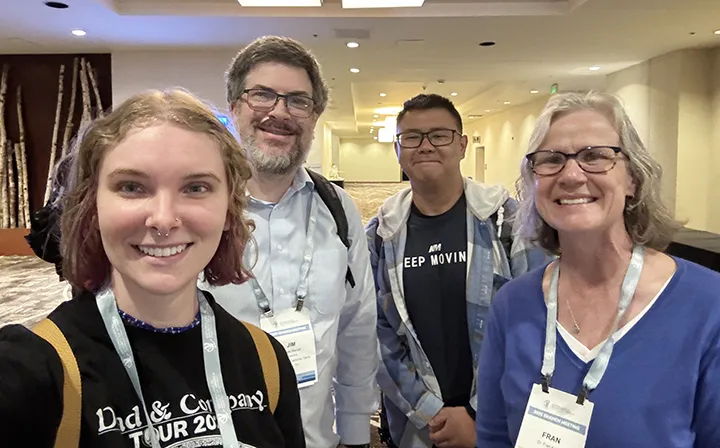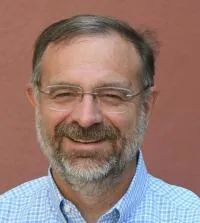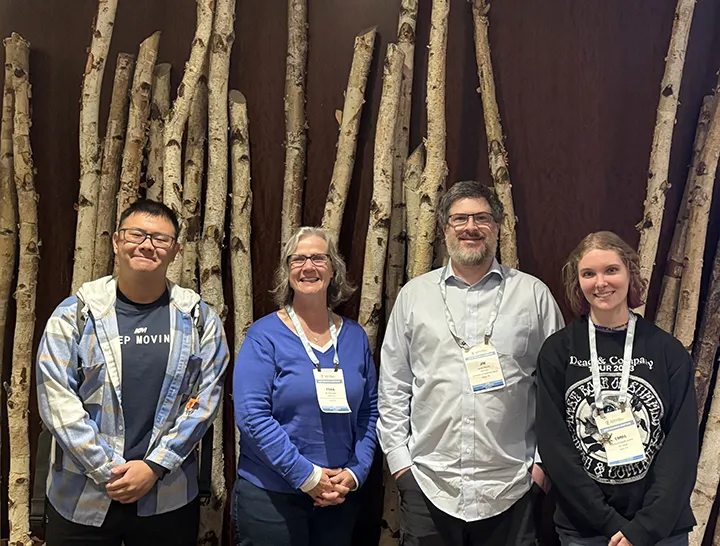
The Jason Bond lab, UC Davis Department of Entomology and Nematology, showcased its work at the annual meeting of the Pacific Branch, Entomological Society of America (PBESA), held this week in Salt Lake City. PBESA encompasses 11 Western states, plus parts of Canada and Mexico, and U.S. territories.
Professor Bond, the Evert and Marion Schlinger Endowed Chair in the Department of Entomology and Nematology, director of the Bohart Museum of Entomology, and associate dean, UC Davis College of Agricultural and Environmental Sciences, is the recipient of the 2025 Systematics, Evolution, and Biodiversity Award. (Due to an illness, he was unable to attend).
Lab member Kaitai Liu, a senior entomology major, received the Dr. Stephen Garczynski Undergraduate Research Scholarship.
James Starrett, research scientist in the Bond lab, presented a talk on “Investigation of Speciation Dynamics and Species Limits in the California Turret Spider, Atypoides riversi."
Doctoral candidate Emma “Em” Jochim delivered a presentation on “Integrative Species Delimitation of Coastal Dune Endemic Trapdoor Spider Aptostichus simus and its Implications for Conservation of Cryptic Species.”
Professor Fran Keller of Folsom Lake College, a research associate at the Bohart Museum of Entomology and the Bond lab, and a UC Davis entomology lecturer, presented a talk on “Effective Population Size and Ecology of California Coastal Dune Trapdoor Spider Aptostichus stephencolberti Bond and Stockman, 2008.”
About Jason Bond, Recipient of Systematics, Evolution and Biodiversity Award

Professor Bond, known as a "powerhouse in the world of systematics and arachnology," specializes in the evolutionary diversification of terrestrial arthropods, specifically spiders, millipedes, and tenebrionid beetles; and researches the landscape scale genomics of California species, with an emphasis on understanding the impact of global change on biodiversity. He is president-elect of the American Arachnological Association.
His colleagues and students praise his exemplary research, teaching, mentoring, public service, and outreach activities. “Jason is an internationally acclaimed, cutting-edge researcher known as an exemplary professor, mentor and collaborator, and hailed for his highly successful outreach efforts that stretch across the state, nation and beyond,” wrote nominator molecular geneticist and physiologist Joanna Chiu, professor and chair of ENT.
Bond is a principal investigator associated with the California Conservation Genomics Project, a state-funded initiative with a single goal: to produce the most comprehensive, multispecies, genomic dataset ever assembled to help manage regional biodiversity.
He serves as the co-editor-in-chief of the ESA journal Insect Systematics and Diversity (ISD), He is also associate editor of Systematic Biology; academic editor of PeerJ; and former associate editor of numerous other journals. Colleague, Professor Christiane Weirauch of UC Riverside, commented: “Dr. Bond has served as a reviewer for virtually every journal in the area of systematic biology and taxonomy and is called upon as a panel member by the National Science Foundation on a regular basis, speaking to his national and international reputation in the field of systematics.”
Bond joined the UC Davis faculty in 2018 from Auburn University, where he directed the Auburn University Museum of Natural History (2011–2016) and served as professor and chair of the Auburn Department of Biological Sciences (2016–2018). He played a major role in the design and construction of a new state-of-the-art collections facility. He also directed the Alabama Natural Heritage Program, guiding its conservation activities of endangered and threatened species in the Southeast.
A native of Tennessee, Bond received his bachelor's degree in biological sciences, cum laude, in 1993 from Western Carolina University, Cullowhee, and his master's degree in biology in 1995 from Virginia Polytechnic Institute and State University, Blacksburg. He obtained his doctorate in evolutionary systematics and genetics in 1999 from Virginia Tech. A veteran of the U.S. Army, he served as a UH-60 Black Hawk helicopter crew chief.
Bond is the third UC Davis recipient of the award since 2014 when UC Davis distinguished professor (now emerita) Lynn Kimsey, then director of the Bohart Museum, won. UC Davis doctoral alumnus (2016) Marek Boroweic of the Phil Ward lab and now an assistant professor in insect systematics at Colorado State University, won it in 2017. (See more on the ENT website)
About Kaitai Liu, Recipient of the Dr. Garczynski Undergraduate Research Scholarship

Liu, recipient of the fourth annual Garczynski Undergraduate Research Scholarship, is a research scholar with the campuswide UC Davis Research Scholar Program in Insect Biology (RSPIB), founded by three UC Davis entomology professors (Jay Rosenheim, Joanna Chiu and Louie Yang). It provides cutting-edge research and mentoring opportunities to promising undergraduates.
Liu, who holds a 3.945 grade point average, works with the Bond lab and the Bohart Museum of Entomology in the state-funded California Insect Biodiversity and Barcode Project, which aims to document all the insect species found in California. At the time of his PBESA application, Liu had prepared more than 700 specimens, confirming the identification, verifying the validity of the scientific name, databasing, and digital imaging of the specimen, and "looking forward to the next step: collecting tissues from the specimens and preserving them for DNA extraction and sequencing.
“My career plans are to pursue a doctorate in entomology, become a professor, and specialize in researching beetles, specifically the rain beetle (Pleocomidae)," Liu said. “Significant geographic boundaries divide the species into multiple spatially isolated populations, which may cause the formation of cryptic species group. The flightless nature of the females may further increase the level of isolation. I am interested in how geographic boundaries contribute to speciation by affecting gene flows and whether morphological characters accurately reflect the genetic diversity between geographically isolated groups."
"I plan to use phylogenetic and phylogeographic approaches to reveal their evolutionary relationship and expand our knowledge of speciation and insect biodiversity in California. I am also interested in their phenology change in response to climate change since their life cycle highly relies on precipitation in the winter. I have visited many habitats of rain beetles, and I am in the process of mapping a detailed distribution of each isolated population.”
The award honors the memory of Garczynski (1960-2019), a research geneticist at the USDA Agricultural Research Service in Wapato, Wash., who “had an unmatched passion for mentoring undergraduate students in their research,” his colleagues said.
Liu is the fourth UC Davis student to win the Garczynski Scholarship. Gwen Erdosh of the lab of Professor Louie Yang, community ecologist, won the inaugural award in 2022, and Gary Ge of the labs of Professor Louie Yang and UC Davis distinguished professor Art Shapiro, received the honor in 2023. (See more on Liu on the ENT website)


